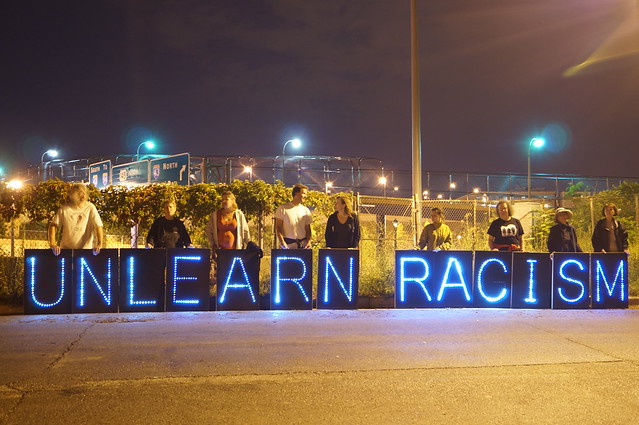 (Image by Joe Brusky used under CC 2.0)
(Image by Joe Brusky used under CC 2.0)
A woman lost her life over the removal of a statue. Her murder is an atrocity and a tragedy. But the greater danger of the horrors that went down in Charlottesville is the readiness of anyone to sympathize with or relativize the white supremacist movement that brought it on.
“I’m tired of seeing white people pushed around,” one marcher told The New York Times. “Jew will not replace us” was chanted by torch-bearers on Friday night. I don’t want to run through the specifics of Confederate monuments or Nazism or the global wave of nationalism. I’ve done that before and plenty are doing that now. Some of the marchers call themselves Neo-Nazis, some call themselves alt-right activists, some identify as Trump supporters first and foremost. But all were white-supremacists.
While plenty of spectators from afar will surely protest that the acts of violence were carried out by only a few, white supremacy is not limited to the willingness to harass minorities into submission. White supremacy is so much bigger than that.
If you believe it’s important that white people remain the majority of the U.S. population—or any Western country—that’s white supremacy. If you want to decide what words are and aren’t offensive to minority groups without listening to anyone belonging to those groups, that’s white supremacy. If you feel self-conscious as the only white person in a room but never consider how often people of color endure that situation, that’s white supremacy. If you feel pushed around at the sight of a non-white or non-Christian person getting a job, a raise, a promotion or an honor that you didn’t get, that’s white supremacy. If you more readily fear non-white and non-Christian criminals and terrorists, that’s white supremacy. If you tend to believe white poverty is about unfairness or personal problems while any other poverty is about inferior cultural values, that’s white supremacy. White supremacy is about power, and if any of us feel threatened when the descendants of slaves request the removal of honors for those who fought to keep their ancestors in chains, we absolutely must ask ourselves where, when and why we feel powerful.
It’s not easy to face these questions. White people in the West grow up used to seeing white people at the center of most conversations. White people today didn’t create slavery, anti-Semitism, colonialism or this white supremacist reality. But we reveal how deeply we have come to believe in it if we can’t handle the idea of seeing the system change.


One Response to “Charlottesville”